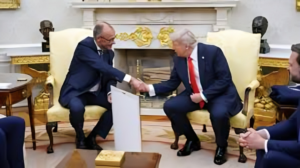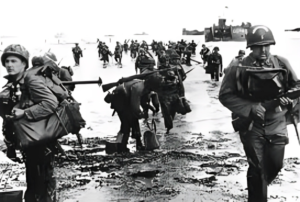Trump’s D‑Day Remark to Germany’s Merz Sparks Diplomatic Stir
In early June 2025, U.S. President Donald Trump welcomed newly elected German Chancellor Friedrich Merz to the Oval Office. Their meeting, intended to strengthen transatlantic ties and coordinate on global challenges, was overshadowed by an unexpected historical misstep. As the leaders commemorated the 81st anniversary of D‑Day, Mr. Trump quipped that June 6 “is not a pleasant day for you,” referring to Germany. The comment reverberated across diplomatic circles, highlighting the delicate balance between historical memory and modern statesmanship.
Introduction
The Oval Office meeting on June 6, 2025, marked Chancellor Merz’s first visit to Washington since his election on May 6. Their agenda included cooperation on energy security, particularly in light of ongoing tensions with Russia, and a shared commitment to global economic stability. Yet, when D‑Day came into the conversation—a day Germany views through the lens of liberation from Nazi dictatorship—Mr. Trump’s remark introduced an unintended note of discord. This article explores the layers behind that moment: the historical significance of D‑Day, the immediate fallout, and the broader implications for U.S.‑German relations.
Background: D‑Day’s Significance
June 6, 1944, remains one of the most consequential dates of the twentieth century. On that day, Allied forces launched Operation Overlord, storming Normandy’s beaches and beginning the liberation of Nazi-occupied Europe. For Chancellor Merz, a politician attuned to history, D‑Day symbolizes both the sacrifice of allied troops and the restoration of his nation’s sovereignty.
- Allied Sacrifice: Over 156,000 American, British, Canadian, and other Allied soldiers participated in the Normandy landings.
- German Perspective: While Germany suffered defeat, the day ultimately ended the horrors of Nazi rule on the continent.
- Modern Memory: Annual commemorations unite former adversaries in honoring those who fought for freedom.

The Oval Office Exchange
During the hour‑long discussion, Chancellor Merz praised the enduring U.S.‑German alliance and underscored the importance of unified support for Ukraine against Russian aggression. Turning to commemorate D‑Day, he expressed gratitude for the role the United States and its allies played in ending Nazi tyranny. Mr. Trump’s response—that June 6 “was not a great day for Germany”—briefly drew laughter but also a sharp intake of breath.
Key moments:
- Energy and Security Briefing
Both leaders agreed on intensifying efforts to diversify Europe’s energy sources and to maintain sanctions on Russia until a lasting resolution in Ukraine. - Commemorating D‑Day
Chancellor Merz noted, “In the long run, June 6 was the liberation of my country from dictatorship.”
President Trump replied, “I understand that, but it must be bittersweet for Germany.” - Immediate Reaction
A press pool member described the room as “awkwardly silent,” followed by polite applause. Diplomats later characterized the remark as a diplomatic faux pas.
Historical Context vs. Diplomatic Nuance
Mr. Trump’s comment, while factually accurate in acknowledging German loss on the battlefield, overlooked the symbolic importance of liberation. In modern Germany, D‑Day commemorations emphasize reconciliation and shared sacrifice:
- Reconciliation Efforts: Since the 1960s, Germany has taken an active role in honoring Allied veterans, with official delegations visiting Normandy annually.
- Collective Memory: German schools teach the significance of D‑Day as both defeat and a moral reckoning against totalitarianism.
- Diplomatic Tradition: Previous German leaders, including Chancellor Angela Merkel, have been met with solemn remembrance ceremonies that underscore unity rather than national grief.
By phrasing his remark as an expression of German sorrow, President Trump inadvertently strained a narrative built on mutual respect and the triumph of democratic values.

Reactions and Media Coverage
News outlets and social media quickly picked up on the exchange. German newspapers featured Chancellor Merz’s poised response, framing it as a subtle teachable moment:
- Local Press: Frankfurter Allgemeine Zeitung lauded Merz for “reminding the world that defeat paved the way for freedom.”
- U.S. Media: Some commentators viewed Trump’s quip as “typical bluntness,” while others warned it risked offending a key ally.
- Public Opinion: In Germany, polls showed a slight dip in approval for the visit’s overall tone, though both governments stressed that long‑term ties remained strong.
Diplomats from allied nations circulated internal memos cautioning against “historical mischaracterizations” that could undermine coalition cohesion.
Lessons for Future Diplomacy
The Trump‑Merz exchange underscores several enduring principles in international relations:
- Mindful Language
Historical references carry deep emotional weight. Leaders must choose words that honor collective memories without reopening old wounds. - Preparation and Briefing
Detailed pre‑meeting briefings on cultural sensitivities can prevent awkward moments and demonstrate respect for partner nations. - Rapid Damage Control
Swift clarifications—such as a presidential statement affirming the U.S. commitment to Germany’s security—help mitigate fallout. - Embracing Shared Narratives
Celebrating joint achievements, like the liberation of Europe, reinforces unity and shared values.
By integrating these practices, future meetings can focus on collaboration rather than congenial missteps.
Conclusion
The June 6 Oval Office meeting between President Trump and Chancellor Merz was, by design, a reinforcement of the U.S.‑German alliance. Yet, a single well‑intentioned historical quip highlighted how easily diplomatic discourse can veer off course. While Chancellor Merz handled the moment with grace—emphasizing that D‑Day marked liberation rather than mere defeat—the incident serves as a reminder: in diplomacy, words matter as much as policies. As both nations continue to face global challenges, honoring history with accuracy and empathy will remain essential to sustaining trust and cooperation.